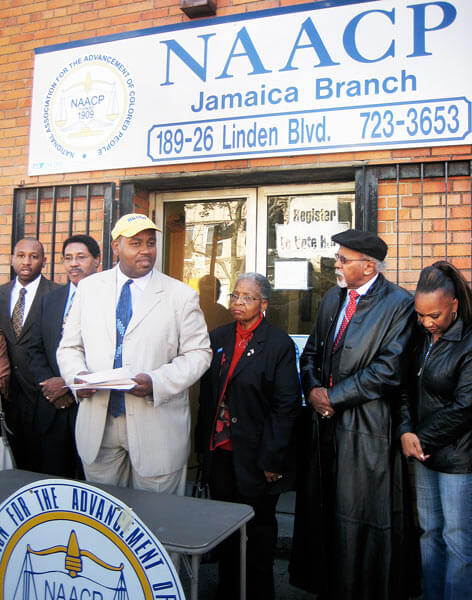By Ivan Pereira
The Jamaica branch of the NAACP and elected officials are putting pressure on the city to step up its efforts to solve the chronic flooding problem they say is devastating southeast Queens.
Leroy Gadsden, president of the branch, announced Tuesday that his office has begun a civil rights and environmental justice investigation into the problem. Due to a high water table underneath the streets of southeast Queens, basements in the area flood easily during any downpour and the problem has been getting worse, according to community leaders.
“We call on the mayor and [city Department of Environmental Protection] commissioner to make this a priority,” said Gadsden, who was joined by state Assembly members William Scarborough (D-St. Albans) and Barbara Clark (D-Queens Village).
Gadsden said his staff would be canvassing the homes in southeast Queens to determine the exact amount of damage that has been caused by the flooding over the years. The investigation will also determine whether the city has engaged in the fair treatment of all citizens regardless of race and ethnicity in terms of the deployment of resources to combat the problem.
“We realize this is a community problem, a community indignity and it requires a community response,” Scarborough said.
Gadsden said he would not rule out court action against the city if the investigation finds any evidence of serious neglect.
DEP said that flooding is a serious issue in many parts of the borough and that it not only invested $241.7 million since 2002 into curbing the problem it will be spending more money and resources over the next decade on storm sewers.
“Over the next 5 years, DEP has already committed approximately $124 million to further upgrade sewers in Southeast Queens to help reduce flooding,” a DEP spokesman said in a statement.
The water table used to be pumped out by the Jamaica Water Supply Co., but when the city took over the company in 1996 it stopped pumping out the water because it was contaminated. For years, DEP has tried to upgrade the pumps with new machines that would pump out and purify the water, but those plans were stalled due to funding problems.
Over the summer the agency announced a request for proposals for engineering firms to design a program to restart 68 supply wells at 44 well stations and pump 67 million gallons of water a day. The program was set up as a way for the city to get alternate sources of water as DEP plans a 2019 construction project to one of its broken aqueducts.
DEP officials said the earliest the pumps could be up and running is 2015, but the community leaders said the start date is too far away.
“This struggle has gone on for too many years,” Clark said.
A DEP spokesman said that the agency is working with the state Department of Environmental Conservation and the United States Geological Survey to examine the water table issue.
New storm sewers were installed in Springfield Gardens, Laurelton and other areas to alleviate the flooding, but Scarborough said all of that work will be moot unless the water table is lowered.
“In a few years, the water table will negate the impact of the sewers,” he said.
Reach reporter Ivan Pereira by e-mail at ipereira@cnglocal.com or by phone at 718-260-4546.



































